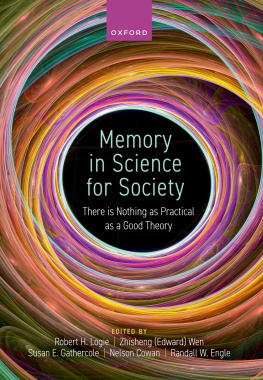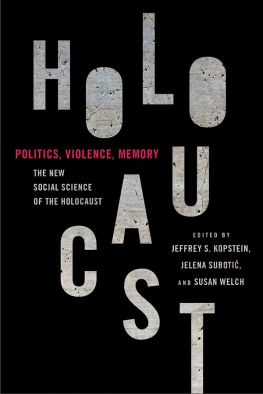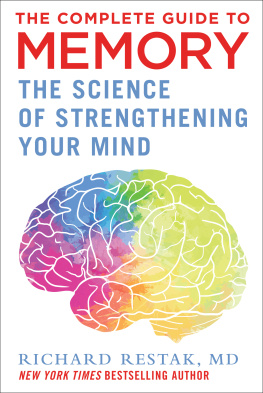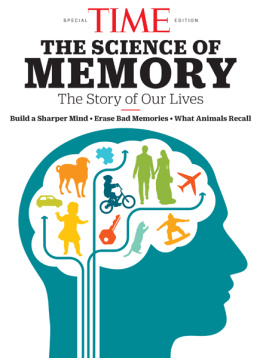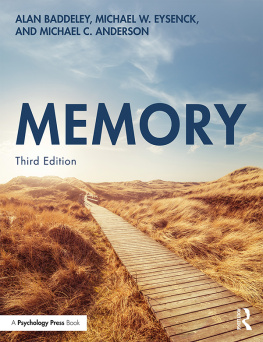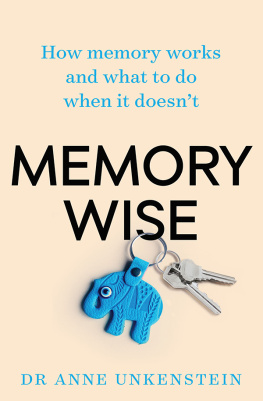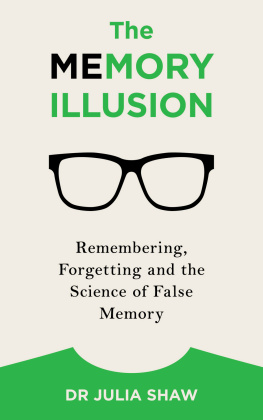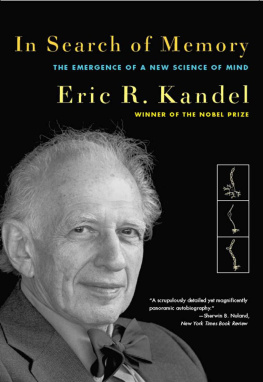Memory in Science for Society

Great Clarendon Street, Oxford, OX2 6DP,
United Kingdom
Oxford University Press is a department of the University of Oxford.
It furthers the Universitys objective of excellence in research, scholarship, and education by publishing worldwide. Oxford is a registered trade mark of Oxford University Press in the UK and in certain other countries
Oxford University Press 2023
The moral rights of the authors have been asserted
First Edition published in 2023
All rights reserved. No part of this publication may be reproduced, stored in a retrieval system, or transmitted, in any form or by any means, without the prior permission in writing of Oxford University Press, or as expressly permitted by law, by licence or under terms agreed with the appropriate reprographics rights organization. Enquiries concerning reproduction outside the scope of the above should be sent to the Rights Department, Oxford University Press, at the address above
You must not circulate this work in any other form
and you must impose this same condition on any acquirer
Published in the United States of America by Oxford University Press
198 Madison Avenue, New York, NY 10016, United States of America
British Library Cataloguing in Publication Data
Data available
Library of Congress Control Number: 2022952036
ISBN 9780192849069
eISBN 9780192665584
DOI: 10.1093/oso/9780192849069.001.0001
Oxford University Press makes no representation, express or implied, that the drug dosages in this book are correct. Readers must therefore always check the product information and clinical procedures with the most up-to-date published product information and data sheets provided by the manufacturers and the most recent codes of conduct and safety regulations. The authors and the publishers do not accept responsibility or legal liability for any errors in the text or for the misuse or misapplication of material in this work. Except where otherwise stated, drug dosages and recommendations are for the non-pregnant adult who is not breast-feeding
Links to third party websites are provided by Oxford in good faith and for information only. Oxford disclaims any responsibility for the materials contained in any third party website referenced in this work.
For Alan Baddeley with thanks for decades of inspiration.
Preface
Developing theory through applications and developing applications through theory: the influence of Alan Baddeley
Professor Alan Baddeley is a world-leading authority on human memory and cognition, best known for his multicomponent model of working memory (Baddeley & Hitch, 1974). In general psychology and cognitive sciences, there is no psychologist more central than Alan Baddeley to the progress that has been made in the last 50 years in understanding the mind, brain, and behaviour. His wide-ranging influence penetrates the diverse domains of human memory, cognition, development, and neuropsychology, and many practical applications of cognitive psychology. Besides his many distinguished honours and awards (CBE, FBA, FRS, FMedSci), and honorary degrees from the universities of Bristol, Edinburgh, Essex, Stirling, and Umea, Alan has published many influential monographs, textbooks, edited volumes, and numerous (theoretical and empirical) papers that have been cited very frequently, reaching a staggering Google Citation Score of over 205,000 (as of 11 April 2022). In recognition of his landmark contributions to psychological sciences and human cognition, this volume is presented both as a book on theory and application of memory research for a broad readership, and as a tribute for Alan to honour and celebrate his enormous contribution and influence across the topics discussed in the individual chapters.
This volume also is a personal thank you to Alan from many of the scholars who have been inspired by him and benefited from his insights and intellectual curiosity over many decades. We have invited chapters from leading international scholars, including Alans close colleagues and associates, collaborators, and friends as well as others whose research has been influenced directly by his pioneering and groundbreaking work. More detail on the different areas of Alans work is provided in his own chapter (), and within the other chapters. Here, each of the volume editors, and one of his closest colleagues (Graham Hitch), briefly share some thoughts on the considerable scholarly and personal influences gained from knowing Alan personally as well as from working with him and reading his work.
Graham Hitch
I regard myself exceptionally fortunate to have Alan as a mentor, a colleague, and a good friend for many more years than I care to remember. My first contact with him was in 1967 through a series of lectures he gave on human memory and performance. I was then a student taking a taught MSc in Experimental Psychology at the University of Sussex after completing a degree in physics at the University of Cambridge. The experimental psychology department in Sussex was an exciting place but even so, Alans lectures stood out, inspiring me by their clarity and accounts of discoveries made through ingenious experiments, especially some of his own on short-term memory. Alan supervised my MSc project on the same topic. It didnt come to much but despite this he encouraged me to follow it up with a PhD, recommending R. Conrad as supervisor, who had been his mentor when both were at the then Medical Research Council (MRC) Applied Psychology Unit (APU) in Cambridge. By the time I started, Conrad had left the APU for Oxford but I was fortunate to be taken on by Donald Broadbent. I kept in touch with Alan throughout, feeling we had something in common, and when my 3 years were up, he invited me to return to Sussex and work with him as a postdoc. The plan was to continue investigating short-term memory. However, we soon realized it was rapidly becoming an unfashionable research topic. We wondered why and I still can recall having lunch together and asking the question What is short-term memory for? We decided to set about answering by experiment. The results are described in our 1974 chapter (Baddeley & Hitch, 1974), together with our proposal of working memory as a multicomponent system. We have kept in touch ever since, wherever we have each been based, sometimes working together, sometimes not. What has kept it going from my point of view is the simple pleasure of sharing ideas with someone so good at turning them into practice, helped by regular meetings of the informal working memory discussion group to which Robert Logie and Sue Gathercole refer in their comments below.
My chapter in this book is intended to illustrate just one example of Alans many penetrating insights over the years, and a small way of saying thank you for his encouragement, continued interest, and support throughout. The phonological loop is a great example of his trademark approach of developing straightforward, highly transmissible theoretical accounts of robust and replicable phenomena, capturing key insights and capable of ready application to practical problems. When neural network modelling came on the scene in the 1980s, Alan was quick to see its potential and strongly encouraged me and others to explore its application to working memory where the phonological loop seemed ripe for treatment. I am pleased to be able to report that this has proved highly fruitful with broad implications extending far beyond the loop itself (see Hitch, , and other chapters in this volume).

